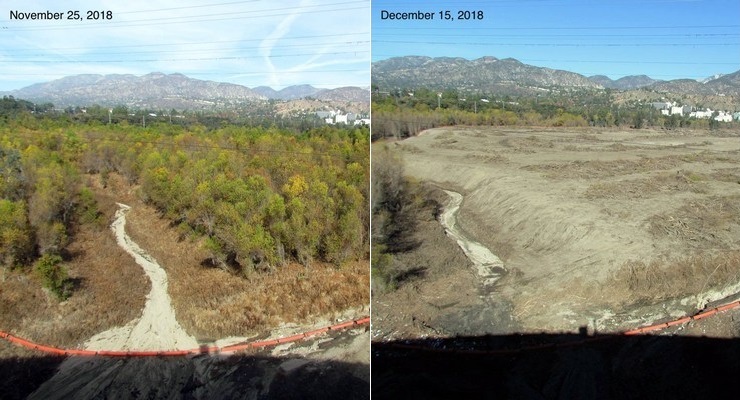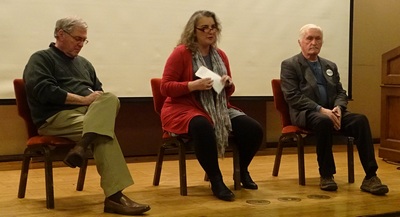
“This is a terrible story about a government out of control. It’s an invading army that has come from the County of Los Angeles, and has not respected the City of Pasadena, or the residents of this area.”
Thus Arroyo Seco Foundation Managing Director Tim Brick angrily described the current state of affairs with the Los Angeles County “Big Dig” sediment removal project in the Hahamongna Watershed Park at Devil’s Gate Dam.
“They are applying a 100-year-old failed process for flood control,” Brick said. “What we’re asking is that the County of Los Angeles not be allowed to destroy our future.”

Brick was speaking at the Arroyo Seco Foundation’s quarterly meeting at the Pasadena Public Library Wednesday.
According to a presentation by the Foundation’s Elizabeth Bour, the initial vegetation removal in the 50-acre project area will be finished February 1. Fencing has been placed around the project area, and actual sediment removal activity may start as early as April 15. Trucking activity will begin April 15 and run through December 31.
The $100 million project will eventually remove 1.7 million cubic yards of sediment from the 70-acre site.
The project, known as the “Big Dig,” was halted in March of last year after members of the Arroyo Seco Foundation brought a lawsuit against the the Los Angeles County Flood Control District in 2016, when the District sought approval to dig out up to 2.4 million cubic yards of sediment behind the dam to remove a threat that heavy rainstorms could inundate the dam and flood homes along the Arroyo Seco Channel.
A subsequent decision and compromise to lower the amount of area being worked on started the removal work again in December. The Arroyo Seco Foundation is currently challenging the decision in two separate cases filed against the County.
Said Brick, “I am not against a sediment management project. But we wanted a careful plan. LA County has the worst air pollution in America, and now they want to bring in trucks 425 times a day.”
“We wanted a slow, steady program of sediment removal, but the County didn’t,” continued Brick.
Bour’s presentation emphasized the importance of community monitoring of the project, noting that 425 truck trips per day at an average of 2 – 3 round trips per truck per day, would equal a fleet of approximately 150 trucks.
The Arroyo Seco Foundation also contends that the “County understated logistical issues and over promised mitigations to obtain approvals, certifications and regulatory permits.”
“Independent mitigation monitoring is necessary,” Bour noted in her presentation, saying that “Reporting violations may result in downscaling of the project by putting regulatory permits at risk.
Should measures and conditions not be met, the report noted, there could be punitive measures, such as suspending truck operators. Regulatory permits could also be rescinded, and the Board of Supervisors could take action against the project.
A fair amount of finger pointing also colored the meeting, as Brick and others blamed Pasadena Mayor Terry Tornek, who was part of the panel discussion, for not doing enough to stop the County.
A new effort by La Cañada High School to join the fight against the project was characterized by Tornek as being “late to the party.”
“The environmental damage has been done,” said Tornek, “and I for one, would like to see some sediment removal … and if La Cañada’s strategy is to impede sediment removal from the site, then it seems to be that we have the worst of both worlds.”
Tornek added, “If the objective is to try and slow the project and not have any trucks, I think that would be bad.”
Tornek told the group that his objective now is determining the “permanent footprint” of the “scraped” area, and how large it will remain.
“The City’s response has been less than ideal. We have not been able to rein in the County, and I share in that frustration” Tornek said. “When the cubic footage came down dramatically, it was shocking to me that we wound up with what we wound up with.”
Tornek said that the City will bear more responsibility to ensure that “fundamental compliance” with the project regulations is being met.
“I will convene an internal group to make sure that our paid people are participating in that process,” he said.
La Cañada High School parent Esther Kornfeld responded to Tornek that she had only heard about the project in September, and then quickly began to gather support at the school.
The Arroyo Seco Foundation will hold a “Save Hahamongna” rally Saturday, January 12, at Hahamongna Watershed Park from 2 to 4 p.m.

















